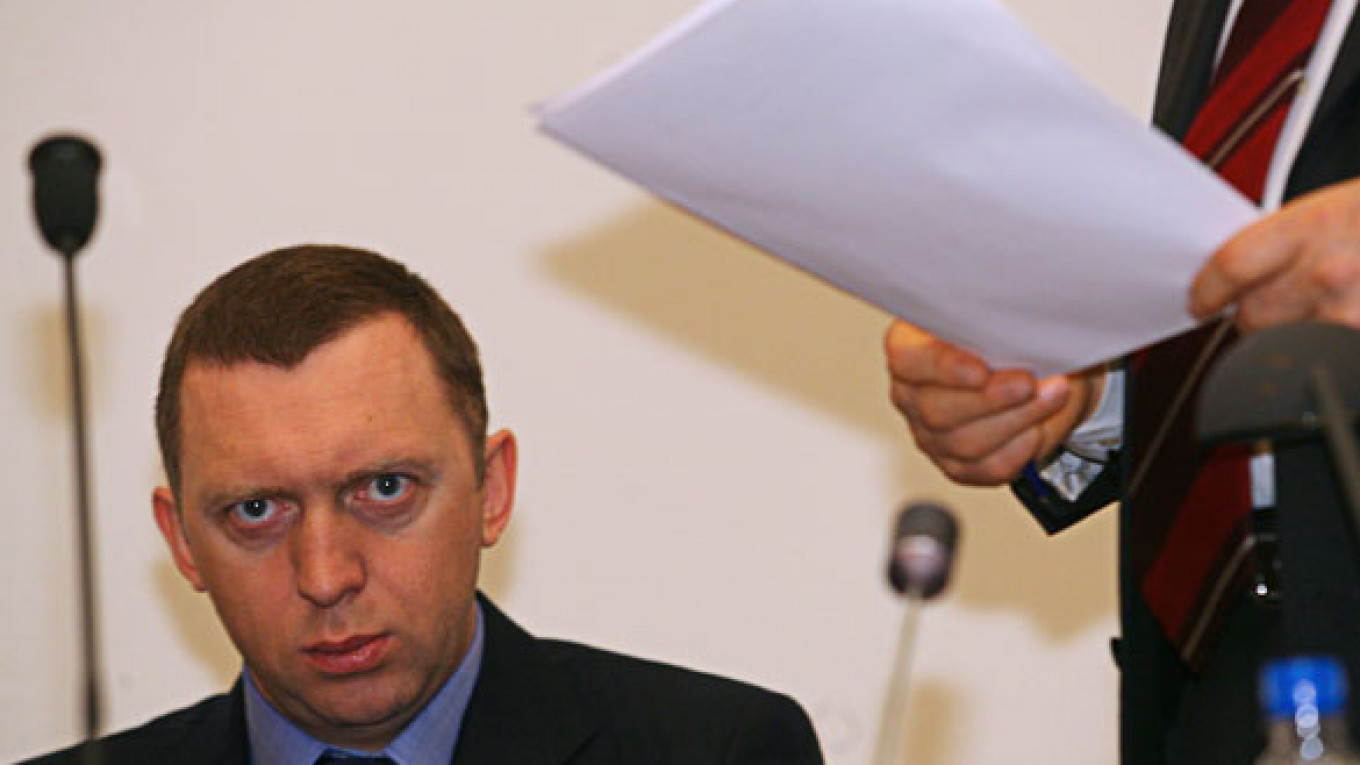United Company RusAl is ready to buy out the stake in Norilsk Nickel held by Vladimir Potanin's Interros Holding to end a shareholder dispute and boost the value of Russia's biggest mining company, RusAl CEO Oleg Deripaska said Friday.
Norilsk would be able to "significantly" raise its market value in six months with more efficient management and by selling underperforming assets, Deripaska told reporters in his Moscow office. Such assets include U.S. precious-metals producer Stillwater Mining, utility OGK-3 and treasury stock, he said.
"The company is now worth $32 billion, but it could be worth significantly more, and competent management could achieve that in half a year," Deripaska said.
RusAl, which owns 25 percent of Norilsk, wants to replace the nickel producer's management, Deripaska said. The billionaire is challenging a June 28 election that gave board control to Interros and Norilsk executives.
"We disagree with these groundless accusations," Norilsk said by e-mail.
Interros has not received a proposal from RusAl offering to buy its stake in Norilsk, said a press official, who declined to be identified, citing company policy. Potanin's holding has said repeatedly that it could buy RusAl's stake but was not willing to sell its own.
Interros owns at least 25 percent of Norilsk after Potanin's former business partner Mikhail Prokhorov sold his stake to Deripaska in 2008. Interros gained control of Norilsk through state asset sales in 1995-97.
RusAl is disputing the board election, saying Interros had agreed in 2008 to support its nominee for board chairman, Alexander Voloshin, an ex-chief of staff to Presidents Boris Yeltsin and Vladimir Putin. Interros has said RusAl failed to garner enough votes to re-elect Voloshin.
Deripaska said he feared that the Norilsk board might prefer a new share buyback to a dividends payout. RusAl — struggling under $12.9 billion in debt — wants the cash-rich metal and mining giant to share its profits with shareholders.
Norilsk's last buyback was in 2008, when it purchased about 4 percent of its own shares on the market for about $2 billion.
Deripaska said he sought dividends of $3 billion for last year during discussions with Interros in April. The Interros official said different options had been discussed for distributing profits but declined to elaborate.
"Interros … believes that to distribute nearly half of profits to shareholders is not just, while we believe it is just," said Maxim Sokov, RusAl's head of strategy.
In May, when RusAl and Interros had the same number of board seats, the Norilsk board rejected RusAl's request to pay 110 percent of its profit, or some $3 billion, in a dividend for 2009 and approved a dividend payout of only $1.3 billion.
Deripaska said that under its 2008 truce agreement between RusAl and Interros, they had agreed that Norilsk should pay an annual dividend of about $2 billion.
RusAl will call an extraordinary meeting of Norilsk shareholders, seeking to re-elect the board as soon as it prepares legal documents to force Interros to vote in accordance with a 2008 shareholder agreement, Deripaska said. Restoring Voloshin to Norilsk's board will require approval of 50 percent of shareholders who attend, Sokov said.
"We have held in-depth talks with a large number of Norilsk minorities, investment funds and received their support," Deripaska said.
Re-electing the board will be the only question RusAl seeks to discuss at the shareholders meeting, he said, adding that the number of independent directors should rise to five or six, from three now.
(Bloomberg, Reuters, MT)
Norilsk said Friday that second-quarter nickel output rose 7 percent on the previous three months to 75,230 tons.
Copper production increased 6 percent in the period to 102,551 tons, the company said in a statement. Palladium output rose 17 percent to 804,000 troy ounces, while platinum production added 24 percent to 198,000 ounces.
A Message from The Moscow Times:
Dear readers,
We are facing unprecedented challenges. Russia's Prosecutor General's Office has designated The Moscow Times as an "undesirable" organization, criminalizing our work and putting our staff at risk of prosecution. This follows our earlier unjust labeling as a "foreign agent."
These actions are direct attempts to silence independent journalism in Russia. The authorities claim our work "discredits the decisions of the Russian leadership." We see things differently: we strive to provide accurate, unbiased reporting on Russia.
We, the journalists of The Moscow Times, refuse to be silenced. But to continue our work, we need your help.
Your support, no matter how small, makes a world of difference. If you can, please support us monthly starting from just $2. It's quick to set up, and every contribution makes a significant impact.
By supporting The Moscow Times, you're defending open, independent journalism in the face of repression. Thank you for standing with us.
Remind me later.






